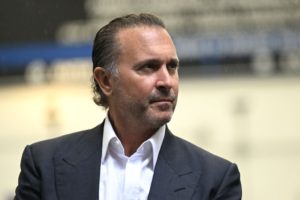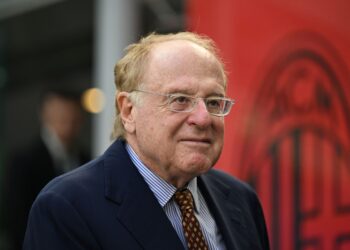Gerry Cardinale, the managing partner of RedBird Capital and owner of AC Milan, recently participated in the "Sloan Sports Analytics Conference" panel at MIT, where he, along with Atalanta co-owner Steve Pagliuca and LAFC co-owner Mitch Lasky, gave a long speech on investments in football, Serie A, and the importance of leveraging data. Here are his words, relayed by Milannews.it.
Gerry Cardinale, what led you to become the owner of three sports teams?
"Just like Steve (Pagliuca), I was only 1.8 meters tall and that's not enough for rowing (laughs). What you learn from rowing is that it's more of a mental challenge than a physical one. This led me to the world of finance and Wall Street. After Harvard, I went to Oxford and participated in a rowing race, where I discovered my love for this type of competitiveness. The great thing about rowing is that it's truly the epitome of team sports and amateur sports. You spend all your time training for a six-minute race, or in the case of the 'boat race,' a 20-minute race, and if you're not rowing in the rain or terrible weather, it's like you're not really doing it (laughs). Playing team sports is a great way to get used to the world of work, I endorse it."
Regarding the sale and value of sports teams, are we in a bubble? Gerry Cardinale added:
"We are definitely in a bubble, but it's not something new. I think we've been in a bubble for a while. A few years ago, after some club sales (in American football), I thought the value couldn't go higher than the purchase price, but look where we are now. On the one hand, I say we've been in a bubble for a while, but on the other hand, it's a phenomenon (the value of various clubs) that continues to grow. The question to ask is 'why is this happening?' I'm not crazy about this idea, it's an easy concept that I'm starting to hear, and it always concerns the concept of sport as an 'asset class.' At least from my point of view, when you start talking about sport as an 'asset class,' everyone needs to stop and say, 'Wait, what's going on?' The reason is that I hear these easy ideas that it's not related to the market, valuations continue to rise, and when you look at the analytical rigor around these things, stock research in sports is based on Forbes magazine (to say that there is no in-depth research but superficial research). It's like looking at the latest operation and putting a profit margin on it. These things could work 20 or 25 years ago. Today, these are multi-billion dollar assets for live events entertainment, and I believe there should be a little more rigor in the concept with which these assets are purchased at a multiple of annual revenue. I also think this is a bit concerning, these assets should be bought at a multiple of annual cash flow, and that's the investment I try to make when we look at these things, knowing whether we can work to profit from an overpayment, and it must be driven by cash flow."
Can you tell us about your path in European football? Toulouse in 2020, Fenway Group (which owns shares in Liverpool, Ed.) in 2021, and now AC Milan in 2022? Do you have a common project vision for all three clubs, or do you look at each of them individually? Gerry Cardinale replied with:
"My 'euphoria' regarding European football is relatively recent. For years I wasn't interested. My business model, when it comes to sports, has always been about the business around the sport, creating partnerships with various rights holders, and creating terminal value businesses around these rights. It started with the Yankees, then the Dallas Cowboys, then the NFL. Five or six years ago, we asked ourselves: 'Why don't we think about integrating vertically and becoming rights holders ourselves?' Doing this in the United States is difficult because of restrictions for institutional capital investment funds, while there are none in Europe. However, in Europe, there is the transfer market and the possibility of relegation. When you see an ecosystem that attracts sovereign states and oligarchs, you have to wonder what you're doing. I have to give credit to Billy Beane; he was the one who 'educated' me. He was in European football for 20 years and told me that I wasn't looking at the situation the right way. I had to approach European football with the 'Moneyball' mentality, which says that there's no need to sacrifice on-field performance for cash flow or vice versa. We spent five years studying and learning. We thought we knew a lot about sports, but when we arrived here (in Europe), we had the feeling that we really needed to do a full immersion. We met with about 200 teams in all the countries, made our first investment with Toulouse, primarily guided by data. It was really a great experiment; the starting price was around €60 million, the team was relegated, and we bought it for €15 million. In the first year, we sold the first player for €15 million, and now we're in Ligue 1, mid-table. It was a great experiment, and we learned a lot. Fenway was something similar, a step towards a bigger club, and in the end, we arrived at AC Milan. I believe that AC Milan is one of the biggest brands in European football. Berlusconi was the first oligarch, he was the George Steinbrenner of his time. One of the things that surprises me is that Milan is the second club for Champions League wins after Real Madrid; I wasn't aware of that. It's an underutilized asset for what its value and level could be, like Serie A. The Italian league has the right to sit at the table with the best, just as Milan has a place at this table. Our job is to bring it there. The advantage for someone like me and Steve (Pagliuca, Ed.) who cut our teeth in this field is being able to bring our mentality and methods to Europe and be very helpful. And there's a need to do it because here, you're moving into something that looks a bit like the Wild West; there are no regulations on ownership: anyone can buy these assets. And so you see a distancing of England from the continent, the commercialization in England compared to the continent, and I believe the only two institutional owners on the continent are RedBird and Qatar in PSG."
















